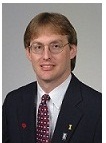 The Alexander Graham Bell Association for the Deaf and Hard of Hearing (AG Bell) is pleased to announce the appointment of board member Ted A. Meyer, M.D., Ph.D., as its secretary-treasurer. Meyer joined the AG Bell board of directors in 2011 and is currently serving a three-year term.
The Alexander Graham Bell Association for the Deaf and Hard of Hearing (AG Bell) is pleased to announce the appointment of board member Ted A. Meyer, M.D., Ph.D., as its secretary-treasurer. Meyer joined the AG Bell board of directors in 2011 and is currently serving a three-year term.
Meyer is an assistant professor in the Department of Otolaryngology at the Medical University of South Carolina (MUSC) in Charleston, S.C. He is a practicing neurotologist and also directs the Otolaryngology Residency Program and the Cochlear Implant Program at MUSC. Among his many accomplishments, Dr. Meyer has attained multiple awards, including the MUSC Department of Otolaryngology Faculty Teaching Award and the Special Research Recognition Award for Excellence from Indiana University Department of Otolaryngology.
Meyer’s start in this field was really just good luck. As an undergraduate at Washington University in St. Louis, Meyer majored in mathematics. As he became involved in research projects as a way to improve his chances of getting into medical school, he continued to find himself working with professionals in hearing science, and otolaryngology was a natural interest that followed.
Meyer has studied under or observed many great surgeons, teachers, researchers, and leaders in the field of otolaryngology including Richard Miyamoto, Mario Svirsky, Bruce Gantz, Michael Novak, Jay Rubinstein and Marlan Hansen.
Dr. Meyer has served on the Editorial Board for Ear and Hearing, and he reviews journal submissions for all the major otolaryngology and speech and hearing journals. He has also shared his knowledge with a variety of audiences including the American Speech-Language-Hearing Association, the Association for Research in Otolaryngology and the American Academy of Otolaryngology – Head & Neck Surgery.
“I am thrilled at the opportunity to work with individuals who are deaf or hard of hearing and their families in a very personal way,” said Meyer. “I look forward to helping AG Bell build on its programs and strengths as it continues to grow and evolve.”
Taken from https://www.listeningandspokenlanguage.org/Document.aspx?id=1394 .

